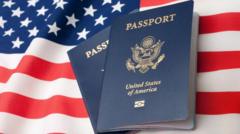The article examines the implications of Trump's executive order to eliminate automatic citizenship for children born in the US to undocumented immigrants and compares the US birthright citizenship policy to those of other countries.
US Birthright Citizenship Debate: A Global Perspective

US Birthright Citizenship Debate: A Global Perspective
President Trump's push to end birthright citizenship has raised questions about citizenship laws worldwide.
President Donald Trump's recent executive order to end birthright citizenship has ignited significant legal opposition and heightened concerns among immigrant communities. For over 160 years, the 14th Amendment has guaranteed citizenship to anyone born in the United States. However, as part of his immigration policy, Trump aims to deny citizenship to children of undocumented migrants or those with temporary visas. Popular opinion appears to support Trump's initiative, as a recent Emerson College poll indicates more Americans favor this change than oppose it. This raises an important question: how does the US's practice of birthright citizenship compare to global norms?
Worldwide, the concept of birthright citizenship, scientifically known as jus soli (right of the soil), is not commonly accepted. The US stands as one of roughly 30 nations, mostly located in the Americas, that confer automatic citizenship to anyone born on its territory. On the contrary, numerous nations in Asia, Europe, and parts of Africa follow the jus sanguinis (right of blood) approach, which bases citizenship on parental nationality rather than place of birth. Some nations incorporate a blend of both principles, granting citizenship to children born to permanent residents as well.
John Skrentny, a sociology professor from the University of California, highlights that while jus soli is prevalent in the Americas, each nation has developed its own unique path to this citizenship philosophy. He notes that the US adopted the 14th Amendment to resolve issues surrounding the citizenship of freed enslaved individuals, while different countries have used birthright citizenship as a strategy for nation-building during their formation, including efforts to include various demographics like indigenous populations and former slaves.
In recent years, multiple countries have re-evaluated their citizenship laws, tightening restrictions in response to immigration concerns, national identity issues, and the practice of "birth tourism," where individuals enter a country solely to give birth. For instance, India once offered automatic citizenship to anyone born on its soil; however, due to illegal immigration issues from neighboring Bangladesh, laws changed in December 2004 to demand at least one parent possess Indian citizenship.
Many African nations saw a shift from the jus soli principle established during colonial rule to laws demanding at least one parent be a citizen or permanent resident after independence. Asian countries, including China, Malaysia, and Singapore, predominantly rely on descent-based citizenship laws.
Also, significant legal changes have occurred in Europe. Ireland, the last European Union country to maintain unrestricted jus soli, ended its birthright citizenship policy following a 2004 referendum, whereby a substantial majority supported a constitutional amendment demanding at least one parent be legally resident. This change was prompted by concerns over foreign women traveling to Ireland to give birth for citizenship purposes.
One noteworthy instance is in the Dominican Republic, where a 2010 constitutional amendment barred undocumented migrants’ children from citizenship. A 2013 Supreme Court decision retroactively revoked citizenship for thousands, predominantly of Haitian descent, which attracted international condemnation. Following outcry, a 2014 law was established to facilitate citizenship for Dominican-born children of immigrants.
Skrentny notes that these changes reflect a broader trend amid an era known for mass migration. Individuals are now strategically navigating the citizenship landscape, leading to intensified debates like the one currently unfolding in the US.
On the legal front, Trump's executive order encounters mounting challenges. Soon after its announcement, numerous lawsuits emerged from Democratic states, civil rights organizations, and individuals. Several federal judges have ruled in favor of plaintiffs, questioning the executive order's constitutionality. Legal experts assert that Trump lacks the authority to amend birthright citizenship through an executive directive, suggesting that a definitive resolution ultimately rests with the courts.
Though the Supreme Court remains a potential arbiter in this matter, the interpretation of the 14th Amendment may hinge on its composition, currently dominated by conservative justices. Nevertheless, ongoing debates highlight how immigration laws and principles shape national identity and the future of citizenship across various jurisdictions.




















